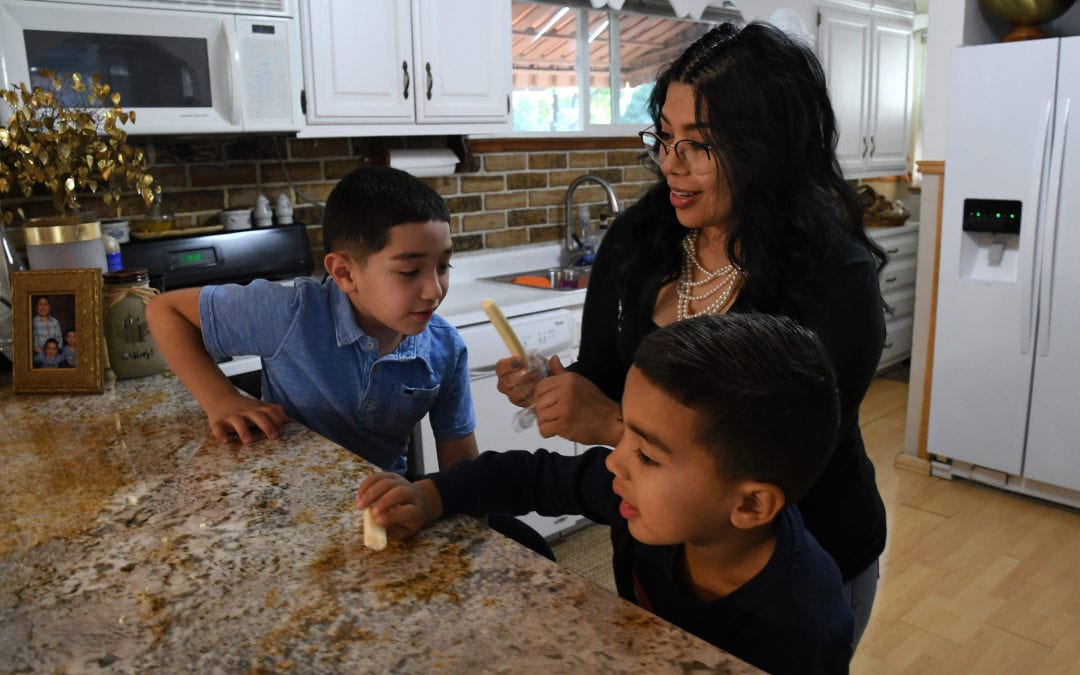Last year, as Sabra Lovejoy’s students were drawing up their ideal future city for a school project, they landed on one idea that, at the time, seemed a far-off dream at best: remote school.
Little did they know that their ideal would be realized within a month and that it would end up being the very last mode of learning they would want to stick.
“Now they appreciate school, and they want to have school in person,” said Lovejoy, who teaches social studies and math to students in grades 6-12 at Campo Undivided High School in southeast Colorado.
Students’ newfound enthusiasm for school has emerged as one bright spot in a year defined by tragedy and dominated by questions about what tomorrow will bring.
And as much as schooling has been disrupted in the past year, Colorado students have also grasped lessons beyond their years — the kinds of lessons that are often learned best outside the classroom: a sense of resilience, how to deal with disappointment and the ability to navigate waves of uncertainty from week to week. For all the classroom moments they’ve missed since last March, they’ve also gained a set of coping skills to steer them through whatever trying times come after the pandemic.
Lovejoy’s son, Malcom, a junior at Campo Undivided High School, has almost grown used to living in a perpetual state of unpredictability.
Like many Colorado students, Malcom, 17, has spent the better part of the school year flitting back and forth between classrooms and learning from home, after abruptly transitioning to remote courses last spring when all Colorado schools shut down.
“Now I anticipate and expect for things to change,” Malcom said, “so it’s not as big of an effect as it first was.”
Still, it hasn’t been easy having to swallow any hope of a normal school year.
For Malcom, one of the biggest disruptions in the past year has revolved around school sports. The three-sport athlete — he’s on the football, track and wrestling teams — had to sit out of football for two weeks as his school had to quarantine and missed two games during the season. His school combines with other small rural schools for sports, and the football season became especially complicated with different rounds of students having to quarantine at different times.

Malcom is also new to wrestling and lost out on a lot of training because of quarantining.
Gianni Carbonaro, a senior at ThunderRidge High School in Highlands Ranch, has experienced a similar sting of disappointment, with baseball seasons interrupted by the pandemic. Carbonaro, 18, has played competitively since sixth grade and was excited about playing varsity ball. Last year, when he would have likely played for his high school’s junior varsity team, the season was canceled as schools reacted to the first weeks of the pandemic.
“One of my highest goals was to play varsity for my high school team,” Carbonaro said, adding that he’s even more eager to get back onto the field this season after having to skip games and practices last year.
“When that got taken away from me last year, it was definitely a big gut punch for sure,” the student-athlete said, describing baseball as his “escape” and his “happy place.”
He’ll step back up to bat this year in a modified season as it stretches past graduation, cutting into his last summer before college. But to Carbonaro’s thinking, sitting out his varsity season isn’t an option. He participated in club baseball last summer, and as he prepares to graduate, he’s ready to continue playing for his high school team into the summer, a finale of sorts for his baseball career.
Carbonaro said he’s been robbed of other key high school experiences he’s waited for, like leading chants at football games and ruling the school along with his senior classmates. He’s also spent a lot of time away from friends, something he said has worn on students’ mental health, and hasn’t seen his grandma in over a year.
Plus, the pandemic has interfered with college tours — he’s explored campuses virtually and on foot with his family when hardly any students were around — and forced him to give up meaningful high school traditions. Among the most important is ThunderRidge High School’s field day, an annual spirit day of activities and competitions that pits the freshmen against the sophomores and the juniors against the seniors. The event, which is as important as prom, typically happens during homecoming week but this year was postponed. Carbonaro, the reigning ping-pong champion two years in a row, hopes he can secure a third victory in April, should his school be able to hold the event.
The pandemic has also shifted Malcom’s perspective about global events and prodded him to pay more attention to what is going on in the world. The past year has opened his eyes to how much his own life out in rural Colorado can be shaped by what is happening far beyond it.
“I think that I will be able to look back and kind of just say, it was a different time and it definitely changed my outlook on the world and how global things could affect me,” Malcom said.
New traditions rise from the ashes of old ones
For some students, like Carmen Rodriquez, time spent alone during the pandemic has nudged life in a better direction.
Carmen, a sophomore at Paonia High School in Delta County, experienced a lot of turbulence during COVID-19. On top of the pandemic, her parents divorced and she came out as bisexual. But she says she’s standing taller because of the disruption and transformation. She hardly recognizes the person she was a year ago.
“I’m the most confident I’ve ever been I think, and I take every opportunity that falls into my lap and I’m confident in doing that,” Carmen, 15, said, crediting her growth to a few months of self-reflection during quarantine.

Others have found silver linings amid all the chaos of the past 12 months. Carbonaro’s family has had more time together, both at home and on vacations, and Carbonaro has grown closer to his father, Joe, now that the pair have more time to work out together.
Carbonaro’s mother, Sesha, learned her own lessons from the pandemic, including how to accept something completely out of her control and manage her family while trying to keep a positive outlook.
Sesha said one of the biggest challenges has revolved around not being able to explain to her children what life looks like during the pandemic or how long the pandemic will last. Parents have struggled to figure out how to guide their children through COVID-19, without firsthand experience getting to the other side of a global catastrophe. But they’ve also found their own resilience along the way.
Sesha reflects on the strength her kids have demonstrated in recent months as they’ve kept their grades up and tried to stay motivated.
“I’m very, very proud of them,” she said.

In Denver, Joanna Rosa-Saenz has also stumbled upon bright spots amid the pandemic. Like Lovejoy, of Campo, she has seen children excited for school, with her sons lighting up upon returning to the classroom.
A single mother of three sons, Rosa-Saenz has soaked up a lot of family time in the last year and added new traditions to her family’s weeks. Along with “Friday family fun night,” in which her family abandons their cell phones for activities, like roller skating, crafting and hiking, she’s eased up on some of her family’s structure to allow her kids to wear pajamas one day a week.
Rosa-Saenz has worked to give back to her community during the pandemic, having launched an education pod — an at-home learning space — that grew to 14 students. She took a lead role in her children’s education.
“Even though it was super stressful and chaotic,” she said, “I was able to see really what my kids needed.”
Lovejoy, the teacher in Campo, recalls some positive effects in the early days of the pandemic, when the shutdown afforded families more time together and more time to learn skills that can’t necessarily be picked up in school, like cooking and raising livestock.
On the flip side, she’s watched with worry as gaps between students with different resources have widened. And now she’s left trying to figure out where her students are academically and how to move them forward. Some of her classes have sixth, seventh and eighth graders clustered together, which is already challenging. After the gaps that COVID-19 exacerbated, Lovejoy said, “it just almost feels impossible sometimes,” especially in math.
But she’s continued to support her students as much as she can, and during remote learning, made sure her phone number was available to them for phone calls and texts messages. Her unwavering perseverance has rubbed off on her son.
“I learned that my family sticks together,” Malcom said, “and that we can make it through hard things.”
This content was originally published here.





